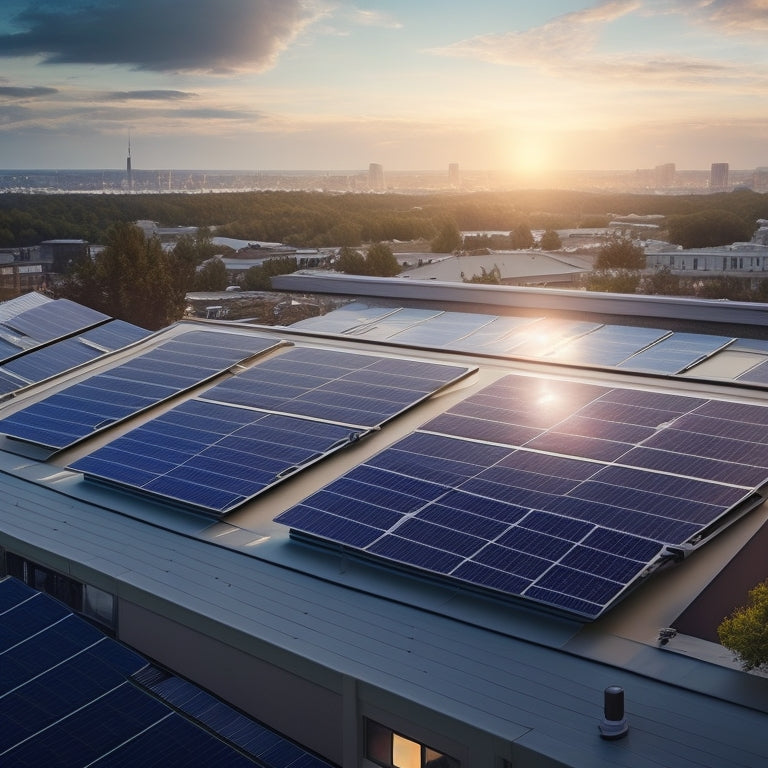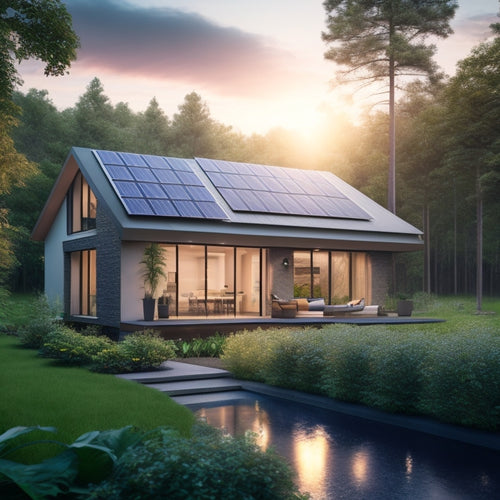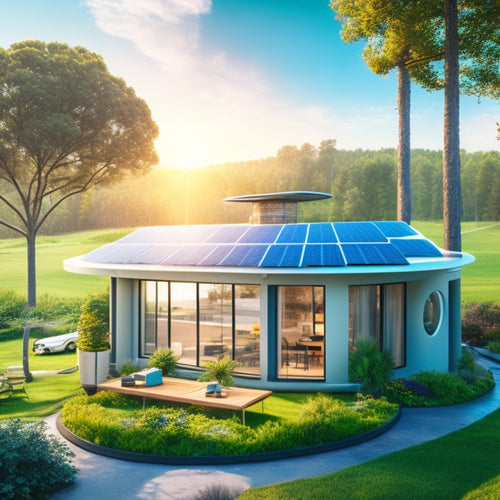
Installing Panels for Business: A Cost Breakdown
Share
When calculating the total cost of installing solar panels for your business, you'll need to take into account a wide range of factors. System size, energy consumption, and budget all play a role, as do roof size, orientation, and shading. You'll also need to evaluate panel quality, efficiency, and labor costs, as well as permits, inspection fees, and inverter and mounting hardware selection. Additionally, battery storage options and federal and state incentives can impact your overall cost. As you explore these aspects, you'll uncover a more thorough understanding of the costs involved in installing solar panels for your business.
Key Takeaways
• Accurate cost projections depend on assessing property suitability, roof size, and energy consumption to determine the optimal system design.
• Labor costs vary depending on installer experience, team size, and overtime pay, with experienced installers potentially reducing costs in the long run.
• High-efficiency panels may increase upfront costs but provide long-term energy production and cost savings, making them a crucial consideration.
• Inverters and mounting hardware selection impact system performance and durability, with certifications and warranties ensuring quality and reliability.
• Federal and state incentives, including tax credits and rebates, can significantly reduce upfront costs and achieve sustainability goals for businesses.
System Size and Cost Factors
When determining the ideal system size for your business, you'll need to take into account factors such as the available roof space, energy consumption, and budget, as these will greatly impact the overall cost of the installation.
A thorough system design is important to maximize energy production and minimize costs. You'll need to assess your business's energy usage patterns to determine the best system size. Accurate cost projections are also necessary to guarantee a successful installation.
By considering these factors, you can create a tailored system design that meets your business's unique needs and budget. This will enable you to make informed decisions about your investment and ensure a strong return on investment.
Commercial Property Assessment
Before installing solar panels, you'll need to assess your commercial property's suitability, considering factors such as roof size, orientation, and shading to determine its potential for energy generation. This assessment will help you identify potential obstacles and opportunities. A thorough evaluation can also increase your property value by highlighting its eco-friendly features and potential for cost savings.
Additionally, a commercial property assessment can help you take advantage of tax benefits, such as the Solar Investment Tax Credit (ITC), which can greatly reduce your installation costs. By understanding your property's unique characteristics, you can optimize your solar panel installation and maximize your return on investment.
Roof Size and Orientation
Your roof's size and orientation play a significant role in determining how much energy your solar panel system can generate, and understanding these factors is key to optimizing your installation.
As you assess your roof, consider the pitch angles, which can affect the system's performance. A pitch angle between 30-40 degrees is ideal, but adjustments can be made for steeper or shallower angles.
Next, conduct an obstruction analysis to identify potential shading issues from trees, buildings, or other structures. This will help you determine the best panel placement and maximize energy production.
Panel Quality and Efficiency
You'll want to prioritize high-efficiency solar panels, as they can greatly increase your system's overall energy production. High-quality panels with high-efficiency rates can harvest more energy per hour of sunlight, resulting in increased energy harvesting. When selecting panels, consider factors such as panel durability, which affects their lifespan and performance over time.
| Panel Type | Efficiency Rate | Durability (Years) |
|---|---|---|
| Standard | 15-17% | 20-25 |
| High-Efficiency | 18-20% | 25-30 |
| Premium | 21-23% | 30-35 |
When evaluating panel quality and efficiency, consider the trade-off between upfront cost and long-term energy production. Investing in high-efficiency panels may increase initial costs, but they can lead to increased energy harvesting and reduced maintenance costs over time.
Installation Labor Costs
When calculating installation labor costs, you'll need to consider several key factors.
First, you'll need to determine the labor hourly rates for the installation team, which can vary depending on the team size and structure.
Additionally, the experience and qualifications of the installation team will also impact labor costs, and you'll want to consider you're getting the most qualified team for your business's solar panel installation.
Labor Hourly Rates
Labor hourly rates for panel installation vary widely depending on factors such as location, installer experience, and type of panel being installed. As a business owner, you'll need to take into account these factors to accurately estimate your labor costs.
Here are some key factors to take into consideration when determining labor hourly rates:
-
Regional wages: Labor rates vary greatly depending on the region, city, or state. For example, installers in urban areas tend to charge higher rates than those in rural areas.
-
Overtime pay: If your installation project requires extended hours or weekend work, you'll need to factor in overtime pay, which can significantly elevate labor costs.
-
Installer experience: More experienced installers typically charge higher hourly rates due to their expertise and efficiency.
Team Size and Structure
To optimize installation labor costs, determining the ideal team size and structure is essential, as it directly impacts the overall efficiency and productivity of your panel installation project.
As the project owner, you need to strike a balance between having a team large enough to complete the job efficiently and avoiding unnecessary labor costs. A well-structured team typically consists of a Project Manager, who oversees the entire operation, and a team of skilled installers.
Effective Team Dynamics are vital, as they guarantee seamless communication, coordination, and task allocation among team members.
Experience and Qualifications
Having a team with the right experience and qualifications is crucial, as it directly correlates with the quality of the installation and, ultimately, the total installation labor costs. You want to guarantee that your installation team has undergone thorough training and holds relevant certifications. This not only secures a smooth installation process but also minimizes the risk of errors and defects.
Look for teams with certification pathways from reputable organizations, such as the North American Board of Certified Energy Practitioners (NABCEP).
Verify that your team adheres to industry standards, such as the International Electrotechnical Commission's (IEC) standards for solar panel installations.
Confirm that your team has experience with similar projects, including commercial-scale solar panel installations.
Permits and Inspection Fees
As you prepare to install solar panels for your business, you'll need to factor in the costs associated with obtaining necessary permits and passing inspections.
You'll need to budget for permit application costs, which can vary depending on your location and the type of permit required.
Additionally, you'll need to account for fees associated with inspections, which will verify that your installation meets local building codes and safety standards.
Permit Application Costs
It's important to take into account your local government's permit application costs, which typically include both permit fees and inspection fees, as they can add up quickly. Be sure to incorporate them in your installation budget from the outset. These costs vary depending on your location and the type of installation you're undertaking.
Some key permit application costs to keep in mind:
-
Local Regulations: Fees associated with complying with local building codes and zoning ordinances
-
Government Fees: Charges for processing and reviewing your permit application
-
Plan Review Fees: Costs for reviewing your installation plans to ensure compliance with regulations
Fees for Inspections
You'll need to factor in fees for multiple inspections, which typically include initial, intermediate, and final inspections, to make certain your installation meets local building codes and regulations. These inspections guarantee your solar panel system is installed correctly and safely. The cost of inspections varies depending on your location and municipal policies. Typically, you can expect to pay between $500 to $2,000 for all inspections.
It's crucial to plan for these fees in your installation budget. Be sure to review your local government's inspection timelines to avoid delays. Understanding the inspection process and associated fees will help you better manage your project's timeline and budget. Factor these costs into your overall installation expenses to ensure a smooth and successful project.
Inverters and Mounting Hardware
For a commercial solar panel installation, selecting the right inverter and mounting hardware is crucial to guarantee efficient energy conversion and a secure, long-lasting setup. You'll want to make sure that your inverter is compatible with your solar panel system, taking into account factors like power output and voltage.
Meanwhile, your mounting hardware should be durable enough to withstand various environmental conditions.
Here are some key considerations for your inverter and mounting hardware:
-
Inverter compatibility: Verify that your inverter can handle the maximum power output of your solar panel system.
-
Hardware durability: Choose mounting hardware that can resist corrosion and withstand extreme temperatures, wind, and weather conditions.
-
Certifications and warranties: Look for inverters and mounting hardware with relevant certifications (e.g., UL, IEC) and extensive warranties that cover repairs and replacements.
Battery Storage Options
As you consider integrating energy storage into your commercial solar panel system, evaluating battery storage options becomes essential to optimize your energy independence and reduce grid reliance.
You'll want to explore Deep Cycle batteries, designed to provide a steady flow of energy over an extended period. These batteries are ideal for commercial applications, offering a reliable source of power during outages or peak demand periods.
When selecting a battery storage solution, consider your energy security needs and the overall cost of ownership. Look for batteries with a long lifespan, high depth of discharge, and efficient charging capabilities.
Federal and State Incentives
By investing in a commercial solar panel system, your business can capitalize on various federal and state incentives that greatly reduce the upfront cost of installation. These incentives can have a substantial impact on your return on investment and help you achieve your sustainability goals.
Some of the key federal and state incentives to explore include:
-
Federal Tax Credits: Receive a tax credit of up to 30% of the total installation cost, which can be claimed against your business's tax liability.
-
Renewable Portfolio Standards (RPS): Take advantage of state-mandated RPS policies, which require utilities to generate a certain percentage of their electricity from renewable sources, creating demand for your business's solar energy.
-
State and Local Incentives: Benefit from additional incentives, such as rebates, grants, and property tax exemptions, offered by state and local governments to promote the adoption of solar energy.
Frequently Asked Questions
Can I Install Solar Panels on a Leased Commercial Property?
Before installing solar panels on a leased commercial property, you'll need to review your lease agreements and understand your property rights to determine if you have the necessary permissions and authority to make such installations.
How Long Does a Typical Commercial Solar Panel Installation Take?
You'll typically spend 3-6 months on a commercial solar panel installation, divided into permitting timelines, installation phases, and site assessments, with crew sizes and project management impacting the process, while weather delays can slow things down.
Are There Any Industry-Specific Solar Panel Installation Requirements?
You'll need to comply with industry-specific solar panel installation requirements, including Permitting Regulations and strict Safety Standards, ensuring your system meets local building codes and electrical safety protocols, and gets approved by local authorities.
Can I Expand My Solar Panel System in the Future if Needed?
As you chart your energy future, imagine building a bridge to span growing energy demands; yes, you can expand your solar panel system in the future if needed, with seamless system upgrades that adapt to your evolving energy landscape.
How Do I Ensure My Solar Panels Are Snow-Load Compliant?
You guarantee snow-load compliance by conducting a structural assessment to determine your roof's load-bearing capacity, then reinforcing it if necessary, and selecting panels and mounting systems certified for snow loads in your region.
Related Posts
-

3 Best Eco-Grants for Home Energy Upgrades
You're eligible for various eco-grants that can help you cut down on energy bills and reduce your carbon footprint by...
-

Gamify Your Home's Energy Generation and Savings
You're taking the next step in optimizing your home's energy generation and savings by utilizing the power of gamific...
-

Why Grow Up? Vertical Gardens Transform Urban Living
As you change your urban living space, you're not just growing up - you're bringing nature back into the heart of the...


